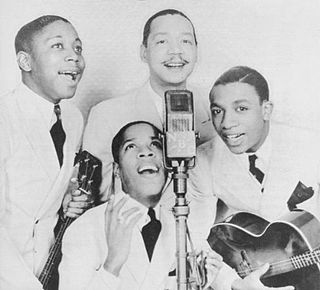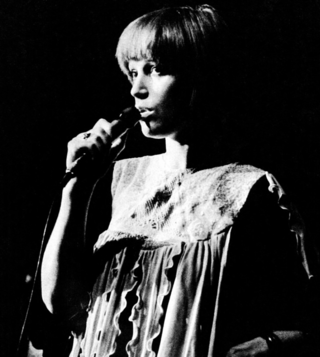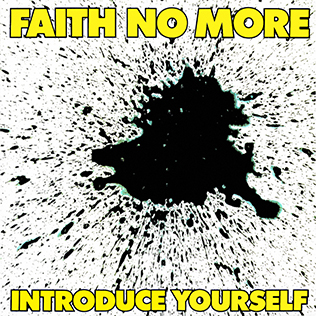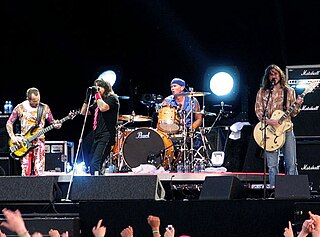Related Research Articles
Java is an island of Indonesia.

John Robert "Joe" Cocker was an English singer known for his gritty, bluesy voice and dynamic stage performances that featured expressive body movements. Most of his best known singles, such as "Feelin' Alright?" and "Unchain My Heart", were recordings of songs written by other song writers, though Cocker composed a number of songs for most of his albums as well, often in conjunction with songwriting partner Chris Stainton.

The Ink Spots were an American pop vocal group who gained international fame in the 1930s and 1940s. Their unique musical style predated the rhythm and blues and rock and roll musical genres, and the subgenre doo-wop. The Ink Spots were widely accepted in both the white and black communities, largely due to the ballad style introduced to the group by lead singer Bill Kenny.
Joe or JOE may refer to:

Pauline Matthews, better known by her stage name Kiki Dee, is an English pop singer. Known for her blue-eyed soul vocals, she was the first female singer from the UK to sign with Motown's Tamla Records.

Introduce Yourself is Faith No More's second studio album, released in 1987. Due to the limited availability of the first album, We Care a Lot, many, including the band, once considered this Faith No More's true debut album. Being the group's major label debut, this album features better production than its predecessor, which is most evident on this album's version of the song "We Care a Lot," which also features updated, more topical, lyrics. It was the last album Chuck Mosley appeared on with the band.
"You Always Hurt the One You Love" is a pop standard with lyrics by Allan Roberts and music by Doris Fisher. First recorded by the Mills Brothers, whose recording reached the top of the Billboard charts in 1944, it was also a hit for Sammy Kaye in 1945.
The hand jive is a dance particularly associated with music from the 1950s, rhythm and blues in particular. It involves a complicated pattern of hand moves and claps at various parts of the body, following and/or imitating the percussion instruments. It resembles a highly elaborate version of pat-a-cake. Hand moves include thigh slapping, crossing the wrists, fist pounding, hand clapping, and hitchhike moves.
William Gordon Reid was an English songwriter, bandleader, pianist and accordionist. He was the first British songwriter to reach the top of the US music chart, with The Ink Spots' 1946 recording of "The Gypsy", and was known for his close association with the singer Dorothy Squires, for whom he wrote that and many other songs.

Jasiel Amon Robinson, better known by his stage name Yung Joc, is an American rapper. He is best known for his 2006 hit single "It's Goin' Down", and as a feature on T-Pain's 2007 U.S. number-one single "Buy U a Drank ".

Since 1983, the American funk rock band Red Hot Chili Peppers has released 13 studio albums, two live albums, 12 compilation albums, 11 video albums, five extended plays, 66 singles, and 53 music videos. To date, the band has sold over 120 million records worldwide. According to the RIAA the Chili Peppers have 6x Multi-Platinum, 2x Platinum and 3x Gold albums in the US, totalling 27.5m. They also have 9x Multi-Platinum, 3x Platinum and 4x Gold singles too, totalling 40m. They have been nominated for 19 Grammy Awards, of which they have won 6. They have the most no.1 singles (15), the most cumulative weeks at no.1 (91) and most top-10 songs (28) on the Billboard Alternative Songs chart.
"If I Didn't Care" is a song written by Jack Lawrence that was sung and recorded by the Ink Spots featuring Bill Kenny in 1939.
The Larks were an American vocal group, active in the early 1950s. They were not the same group as the Los Angeles-based Larks featuring Don Julian, nor the Philadelphia-based group The Four Larks.
The Serendipity Singers were a 1960s American folk group, similar to The New Christy Minstrels. Their debut single "Don't Let the Rain Come Down " was a Top Ten hit and received the group's only Grammy nomination in 1965. The majority of the group's recording sales took place in a two-year period of 1964 and 1965. The group's name was sold in the 1970s resulting in entirely new lineups of group members performing under the name The Serendipity Singers into the early 21st Century.
Bad Boy is a song written by Lil Armstrong and Avon Long. It became a hit for The Jive Bombers in 1957. The song has since been covered by The Escorts, Mink DeVille, Ringo Starr, Sha Na Na, Maryann Price, David Johansen performing as Buster Poindexter, and others, and was used in the first-season finale of the television show "Crime Story" as well as in the 1990 film Cry-Baby. The Mink DeVille version was included in the 1983 film Breathless.
Asa "Ace" Harris was an American jazz pianist.
"Ciribiribin"[tʃiribiriˈbin] is a merry Piedmontese ballad, originally in three-quarter time, composed by Alberto Pestalozza in 1898 with lyrics by Carlo Tiochet. It quickly became popular and has been recorded by many artists. Decades later it enjoyed continued popularity with swing and jazz bands, played in four-four time.
"When the Swallows Come Back to Capistrano" is a song written by Leon René and first recorded by The Ink Spots featuring Bill Kenny in May 1940. The Ink Spots' recording of the song reached No. 4 on the US charts.

William Francis Kenny Jr. was an American vocalist with a wide vocal range spanning four octaves. Often regarded as one of the most influential high-tenor singers of all time, Kenny was noted for his "bell-like" vocal clarity and impeccable diction. Although he is most famous for his role as lead tenor with the Ink Spots, Kenny also led a successful solo career after disbanding the Ink Spots in 1954. Throughout the 1950s and 60s Kenny recorded, toured the world and appeared on many popular variety television shows. In 1966 Kenny became the star and host of his own musical variety show The Bill Kenny Show which aired on CBC. In 1989, 11 years after his death, Bill Kenny was inducted into the Rock and Roll Hall of Fame. Kenny is often noted as being the "godfather" of R&B tenor vocalists.

If I Didn't Care is a 1979 compilation album by the Ink Spots originally issued by Columbia Records. All tracks are stereo re-recordings of their original Decca Records hits.
References
- ↑ Lokker, Brian. "Java Jive by the Ink Spots". Coffee Crossroads. Retrieved July 21, 2015.
- ↑ Whorf, Michael (2012). American Popular Song Lyricists: Oral Histories, 1920s–1960s. Jefferson, NC: McFarland. p. 79. ISBN 9780786490615.